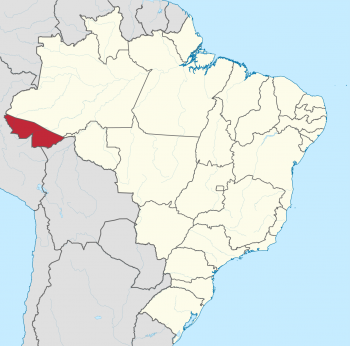Brazilian states: Acre Posted by carol on Aug 23, 2019 in Brazilian Profile, Culture, Customs, Geography, Learning
Olá a todos! Hello to all! How well do you think you know Brazil? Well enough to know Acre? Despite its continental dimensions, only a small portion of Brazil is conhecida (known) to those who visit it or even to those who are native. In total, Brazil is divided into 27 estados (states) and each one has its own culture and customs, though it still dialogues with regionalisms in other parts of the country. With that in mind, we are starting a series of posts that will cover a different Brazilian state each month, talking about the culture, the local culinária (cuisine), the location on the map and curiosities. For our first text, we will present a state that ironically became famous among Brazilians for being so unknown: Acre.
Engulfed by the Amazon floresta (rainforest), Acre is located in the northern region of the country and its capital city is Rio Branco. It borders not only the states of Amazonia and Rondônia, but also two other South American countries, Bolivia and Peru. Perhaps the jokes that Brazilians tell about Acre are partially due to the fact that it was the last state to be constituted in Brazil, becoming official as a federative unit in 1962.
The population of Acre is mostly made up of indigenous people, mainly Bolivian, but also northeastern migrants who moved to the region in the early twentieth century to work with borracha (latex) extraction from the rubber tree, the state’s major economic activity. The influence of migrants from northeastern Brazil is present its cuisine, since they brought the camarão (shrimp) bobó, carne de sol (sun dried meat), macaxeira (also known in other regions of Brazil as cassava) and vatapá (a traditional dish of Afro-Brazilian cuisine). For indigenous people, the influence is remarkable when it comes to pratos (dishes) such as pato (duck) and pirarucu (one of the largest freshwater fish in Brazil).
Although they are the state with the lowest population density in Brazil, Acre has great relevance for the culture and politics of the Amazon rainforest. Traditional artesanato (craft) is made from forest materials; the rubber tapper became an important popular figure for the history and desenvolvimento (development) of the country; from the forest also emerged Chico Mendes, an internationally recognized activist for the Amazon preservation, winner of a UN award, the Global 500 years.
Was Acre also desconhecida (unknown) to you? Do you know anyone from there? You may also remember the Acre Boy, whose case was well known in Brazil. I hope you enjoyed learning a little more about this great Brazil.

Build vocabulary, practice pronunciation, and more with Transparent Language Online. Available anytime, anywhere, on any device.




